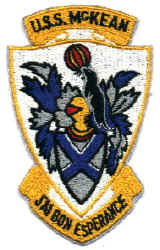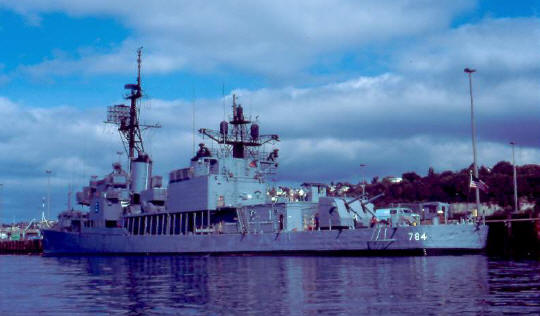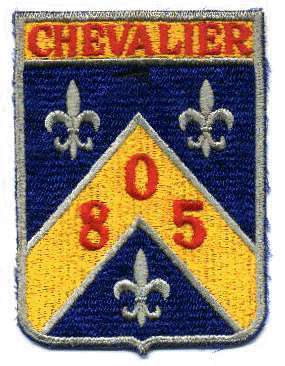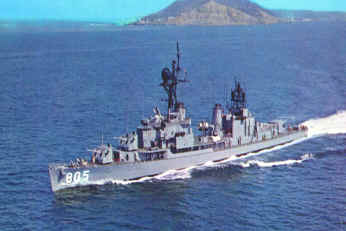
DECK LOGS
By Dave Hood, GMT2, USS McKean (DD 784)
 When I reported aboard the USS McKEAN DD-784 I was a 3rd Class Gunners’ Mate. I
was assigned to a Work Center (WW01 – ASROC,) a Division (WA – Weapons ASW), a
Department (Weapons), a life boat, a GQ station, (Sight Setter, Mount 52) a DC
station (one of the repair lockers), a Condition 1AS station (Sub hunting-ASROC
LCCS), an Underway Watch station (After steering room) and finally, an inport
duty section.
When I reported aboard the USS McKEAN DD-784 I was a 3rd Class Gunners’ Mate. I
was assigned to a Work Center (WW01 – ASROC,) a Division (WA – Weapons ASW), a
Department (Weapons), a life boat, a GQ station, (Sight Setter, Mount 52) a DC
station (one of the repair lockers), a Condition 1AS station (Sub hunting-ASROC
LCCS), an Underway Watch station (After steering room) and finally, an inport
duty section.
In port, we were on six-section duty. One day out of every
six, the duty section had to stay aboard for 24 hours and safeguard the ship.
(On weekends the duty section stayed aboard from Friday to Monday morning.)
Besides my regular ASROC duties I was expected to be part of the Duty Section’s
DC team (Damage Control - Fire, Flooding, Rescue), Shipboard Security Team and
work parties. While I was still an E-3 I was expected to stand at least one
4-hour Quarterdeck watch as “The Petty Officer Of the Watch” – POOW. When I made
E-5 I stood “Officer Of The Deck” –OOD- watches. (I was also Duty Gunners’ Mate
and Duty Master At Arms.)
It is the responsibility of the Inport (OOD) to update the
Quarterdeck Log. Entries in the log might say,
“2345. Assumed the duty as OOD. EM3 Metcalf is POOW and BTFN Taylor is Sounding
and Security.”
At midnight you had to start a new page in the log and start it off with
24 April 1979. Moored starboard side Pier 90 Seattle. Ship is
in a Cold Iron status and receiving all Hotel services from the pier. (Cold Iron
meant that our engineering plant was shut off. Hotel services were fresh water,
electricity and steam. If we were tied up to a pier that couldn’t provide those
essential services, say a city pier in a liberty port, our engineers would have
to keep some of the boilers running.) CO and XO are ashore. CDO is LT(jg)Bond.
SOPA is ComCruDesGru5 and SubSOPA is DesRon37. (You had to keep tabs on the old
man and the Exec. Whenever they crossed the brow you had to write it in the log.
The Command Duty Officer – CDO- is the officer in charge of the duty section and
also in charge of the ship in the CO’s absence. SOPA stands for Senior Officer
Present Afloat and that would refer to just who was in charge of our ship. In
did not mean the nearest high-ranking Admiral- it meant who was directly in the
McKEAN’s chain of command. McKEAN was part of Destroyer Squadron 37, which was
attached to Cruiser/Destroyer Group 5.)
0020. Sounding and Security reports All Secure. (The Sounding and Security watch
had to rove the entire ship every hour and take soundings in various fuel and
water tanks as well as voids to ensure that the ship wasn’t taking on unexpected
water.)
 0130. ET1 James Calloway, 430-23-8945, reported aboard for duty. (Whenever a new
crewman checked aboard his name would be entered in the log. The POOW would find
and wake up the duty representative, in this case someone from Operations, to
make sure that the new guy gets a rack and a locker and squared away for the
night. Actual check-in would take place during the following workday.)
0130. ET1 James Calloway, 430-23-8945, reported aboard for duty. (Whenever a new
crewman checked aboard his name would be entered in the log. The POOW would find
and wake up the duty representative, in this case someone from Operations, to
make sure that the new guy gets a rack and a locker and squared away for the
night. Actual check-in would take place during the following workday.)
It pretty much went like that all night long. Just write down
the Sounding and Security reports (and it was always “Sounding and Security
reports all-secure.”) and anything out of the ordinary.
The log was presented on a daily basis to the CO (or to the
CDO) for his review and signature.
One of our 1st class Quartermasters told me that what gets
written down into the QD log really isn’t important. One of his duties was to
transcribe what was in the QD log (what he called “Rough entries) and put them
into a “Smooth log” that was the actual record seen by the old man.
One particularly dull Mid-watch (2400~0400) I recalled what
he had told me.
I decided to put it to the test.
30 April 1979. Moored starboard side Pier 90 Seattle. Ship is
in Cold Iron status, receiving all Hotel services from the Pier. CO and XO are
ashore. SOPA is ComCruDesGru5, SuSOPA is DesRon 37. CDO is LT(jg) Bond.
0025 Sounding and Security reports all-secure.
0045 I don’t like my Petty Officer of the Watch.
0057 I hate my POOW.
0114 I loathe my POOW
0128 Sounding and Security reports all-secure.
0139 I have decided to kill my POOW.
0152 I have a plan on how to kill my POOW
0205 I am standing behind my POOW
0206 I have my hands around my POOW’s throat
0207 I am applying intense pressure to my POOW’s ceratoid artery
0208 I let go of my POOW and he fell to the deck of the QD shack
0209 Sounding and Security reports all-secure
0210 Sounding and Security finally went away. My POOW is gasping for breath
0211 I am again choking my POOW
0214 My POOW has stopped breathing.
0220. After resting, I tossed my POOW over the side.
0222 I am alone on the QD. All is well
0310 Sounding and Security reports all-secure. I tell him the POOW left to use
the head and hasn’t returned. Sounding and Security goes to notify the CDO.
0330 A new POOW, SN Parker, is on duty.
0342 I don’t like this new POOW
None of the crew could figure out why the QMs kept looking at me so funny.

 Well
now, wait just a minute, Mr. Hood, Commander Richard King USN (ret), formerly of
the U.S.S. CHEVALIER (DD-805) would like to offer some comments on your little
story........
Well
now, wait just a minute, Mr. Hood, Commander Richard King USN (ret), formerly of
the U.S.S. CHEVALIER (DD-805) would like to offer some comments on your little
story........
Six Section
Duty? SHIT, I thought we did good to have five section.
In the sixties
Four Section was the norm in port CONUS, five section was rare and limited to
cocky CO's such as G.G. Ely Kirk on the USS Chevalier DD-805. I think there
were minor inaccuracies in your story, nothing major, and things you would not
as a square bore PO be expected to know. At first I was going to suggest
changes only to you. Then I thought there may have been changes in the decade
between my service and yours, so I decided to shotgun. This is not being picky,
lets just get it right.
(1) "BTFN
Taylor is Sounding and Security". PROBABLY WRONG. It is not likely that a BTFN
would ever stand that watch at least on a Gearing DD. Most Sounding and
Security watch standers were in "R" Division (engineering auxiliaries) or were
ET's (believe it or not). A BTFN would be standing "Cold Iron Watch" (going
back and forth between both fire rooms) checking on pumps, etc.
(2) "Hotel
Services were fresh water, electricity and steam". That is true, but the steam
should be identified as 100 psi steam and often "fire and flushing" water (salt
water) was sometimes provided.
(3) SOPA was
actually the senior line officer in a given geographical area, not necessarily
in the chain of command. See "Typhoon", SOPA for
Chevy was then the tender Captain in Kaosiung.
(4) You wrote
"Sounding and Security Watch would sound tanks (water or fuel)". Not so! He
would sound voids and visually inspect other spaces on his route (he had an
assigned route) but tanks were not on his route. Tanks were the responsibility
of the Oil King, the
Water King, and or their assistants.
(5) Rough
Logs: They were collected by the quartermasters but review was by the "Senior
Watch Officer", usually on a Gearing the OPS officer and usually doing double
duty as Navigator. Smooth logs were (in the sixties) were prepared in ink after
the fact by the CDO's in port and the OOD's underway using the rough logs as a
guide.
I was "put in
hack" (confined to the ship) on many Saturdays until all my "smooth logs were
"perfect". "Put in Hack" was the primary way junior officers were punished for
not being perfect. There were several types, confined to the ship, confined to
your quarters or some mix. Never in Naval Regulations nor in the Manual for
Court Martial nor in the Uniform Code of Military Justice (UCMJ) have I come
across the procedure of being "PUT IN HACK". Maybe there is a story there, an
officer version of "Rocks and Shoals"?
Times change
and things change, but in the mid to late sixties, there was an in-port cold
iron watch for M and B Division people, at least the lower grades. Remember, we had TWO fire rooms and
TWO engine rooms, we would assign one junior BT to both fire rooms and one
junior MM to both engine rooms on a four hour watch schedule. They were also
assigned some work to do while on watch, but they also were directed to check
the main engineering space where they were not assigned work every hour on the
hour. Even at cold iron, we had working switch boards and fresh water pumps and
fire and flushing pumps running. My memory is a bit feeble (Alzheimer's) but I
think enlisted main propulsion snipes didn't have to fool with quarterdeck
watches until the E-5 level, perhaps E-6. And that is why the sounding and
security watch could skip the main engineering spaces and concentrate on small
obscure spaces.
Division people, at least the lower grades. Remember, we had TWO fire rooms and
TWO engine rooms, we would assign one junior BT to both fire rooms and one
junior MM to both engine rooms on a four hour watch schedule. They were also
assigned some work to do while on watch, but they also were directed to check
the main engineering space where they were not assigned work every hour on the
hour. Even at cold iron, we had working switch boards and fresh water pumps and
fire and flushing pumps running. My memory is a bit feeble (Alzheimer's) but I
think enlisted main propulsion snipes didn't have to fool with quarterdeck
watches until the E-5 level, perhaps E-6. And that is why the sounding and
security watch could skip the main engineering spaces and concentrate on small
obscure spaces.
The "cold iron
watches" covered the big four main snipe spaces, "Sounding and Security" covered
everything else. Generally, on the in-port quarterdeck, "MOTW" (Messenger of the
Watch) was an E-2 or E-3. "POOW" (Petty Officer of the Watch) was an E-4 or E-5
(and he packed the pistol). "OOD" was either an E-6, E-7 or O-1 (and he held a
so called "telescope" with no lenses in it, just a heavy stupid symbol of
"authority". Who thought some of this shit up? Captains had discretion on who
filled the in-port OOD watches. Between WWII and post Vietnam, many captains
lowered the rank bar so to speak. In the fifties, all in port destroyer OOD's
were officers. Later chiefs were put there. By Vietnam, many destroyer ships
assigned E-6's as OOD in port.
When I
returned to USNR drilling, I stood the usual engineering watches in port, that
is until USS VAMMEN left for the inactive ship facility and USS MADDOX became a
reserve ship. I was by then a chief and I was surprised to find my name on the
watch list for OOD. "ENGINEERS DON'T STAND DECK WATCHES!"---"They do now" I was
told. So I started standing OOD watches, although I would rather have been
Sounding & Security. My big problem was that I had never stood a deck watch
before as POOW or MOTW. I had no training of any kind, nada, zilch. So I muddled
my way through for another few years with little problems but I never enjoyed
it.




